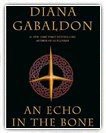Outlander aka Cross Stitch - Gabaldon Diana (читать книгу онлайн бесплатно полностью без регистрации .TXT) 📗
I had no appetite for the bannocks and parritch that Mrs. FitzGibbons had brought for my breakfast, but crumbled a bit and pretended to eat, in order to gain some time for thought. By the time Mrs. Fitz came back to conduct me to the MacKenzie, I had cobbled together a rough plan.
The laird received me in a room at the top of a flight of stone steps. It was a tower room, round, and rich with paintings and tapestries hung against the sloping walls. While the rest of the castle seemed comfortable enough, if somewhat bare, this room was luxuriously crowded, crammed with furniture, bristling with ornaments, and warmly lit by fire and candle against the drizzle of the day outside. While the outer walls of the castle had only the high slit windows suited to resisting attack, this inner wall had been more recently furnished with long casement windows that let in what daylight there was.
As I entered, my attention was drawn at once by an enormous metal cage, cleverly engineered to fit the curve of the wall from floor to ceiling, filled with dozens of tiny birds: finches, buntings, tits, and several kinds of warblers. Drawing near, my eye was filled with plump smooth bodies and bead-bright eyes, set like jewels in a background of velvet green, darting among the leaves of oak, elm, and chestnut, carefully tended trees rooted in mulched pots set on the floor of the cage. The cheerful racket of conversing birds was punctuated by the whir of wings and rustle of leaves as the inhabitants flitted and hopped about their business.
“Busy wee things, are they no?” A deep, pleasant voice spoke from behind me, and I turned with a smile that froze on my face.
Colum MacKenzie shared the broad planes and high forehead of his brother Dougal, though the vital force that gave Dougal an air of intimidation was here mellowed into something more welcoming, though no less vibrant. Darker, with dove-grey rather than hazel eyes, Colum gave that same impression of intensity, of standing just slightly closer to you than was quite comfortable. At the moment, though, my discomfort arose from the fact that the beautifully modeled head and long torso ended in shockingly bowed and stumpy legs. The man who should have topped six feet came barely to my shoulder.
He kept his eyes on the birds, tactfully allowing me a much-needed moment to gain control of my features. Of course, he must be used to the reactions of people meeting him for the first time. It occurred to me, glancing around the room, to wonder how often he did meet new people. This was clearly a sanctuary; the self-constructed world of a man to whom the outer world was unwelcome – or unavailable.
“I welcome ye, mistress,” he said, with a slight bow. “My name is Colum ban Campbell MacKenzie, laird of this castle. I understand from my brother that he, er, encountered you some distance from here.”
“He kidnapped me, if you want to know,” I said. I would have liked to keep the conversation cordial, but I wanted even more to get away from this castle and back to the hill with the standing stone circle. Whatever had happened to me, the answer lay there – if anywhere.
The laird’s thick brows rose slightly, and a smile curved the fine-cut lips.
“Well, perhaps,” he agreed. “Dougal is sometimes a wee bit… impetuous.”
“Well.” I waved a hand, indicating gracious dismissal of the matter. “I’m prepared to admit that a misunderstanding might have arisen. But I would greatly appreciate being returned to… the place he took me from.”
“Mm.” Brows still raised, Colum gestured toward a chair. I sat, reluctantly, and he nodded toward one of the attendants, who vanished through the door.
“I’ve sent for some refreshment, Mistress… Beauchamp, was it? I understand that my brother and his men found ye in… er, some apparent distress.” He seemed to be hiding a smile, and I wondered just how my supposed state of undress had been described to him.
I took a deep breath. Now it was time for the explanation I had devised. Thinking this out, I had recalled Frank’s telling me, during his officer’s training, about a course he had taken in withstanding interrogation. The basic principle, insofar as I remembered it, was to stick to the truth as much as humanly possible, altering only those details that must be kept secret. Less chance, the instructor explained, of slipping up in the minor aspects of one’s cover story. Well, we’d have to see how effective that was.
“Well, yes. I had been attacked, you see.”
He nodded, face alight with interest. “Aye? Attacked by whom?”
Tell the truth. “By English soldiers. In particular, by a man named Randall.”
The patrician face changed suddenly at the name. Though Colum continued to look interested, there was an increased intensity in the line of the mouth, and a deepening of the creases that bracketed it. Clearly that name was familiar. The MacKenzie chief sat back a bit, and steepled his fingers, regarding me carefully over them.
“Ah?” he said. “Tell me more.”
So, God help me, I told him more. I gave him in great detail the story of the confrontation between the Scots and Randall’s men, since he would be able to check that with Dougal. I told him the basic facts of my conversation with Randall, since I didn’t know how much the man Murtagh had overheard.
He nodded absorbedly, paying close attention.
“Aye,” he said. “But how did you come to be there in that spot? It’s far off the road to Inverness – you meant to take ship from there, I suppose?” I nodded and took a deep breath.
Now we entered perforce the realm of invention. I wished I had paid closer attention to Frank’s remarks on the subject of highwaymen, but I would have to do my best. I was a widowed lady of Oxfordshire, I replied (true, so far as it went), traveling with a manservant en route to distant relatives in France (that seemed safely remote). We had been set upon by highwaymen, and my servant had either been killed or run off. I had myself dashed into the wood on my horse, but been caught some distance from the road. While I had succeeded in escaping from the bandits, I had perforce to abandon my horse and all property thereon. And while wandering in the woods, I had run afoul of Captain Randall and his men.
I sat back a little, pleased with the story. Simple, neat, true in all checkable details. Colum’s face expressed no more than a polite attention. He was opening his mouth to ask me a question, when there was a faint rustle at the doorway. A man, one of those I had noticed in the courtyard when we arrived, stood there, holding a small leather box in one hand.
The chief of Clan MacKenzie excused himself gracefully and left me studying the birds, with the assurance that he would shortly return to continue our most interesting conversation.
No sooner had the door swung shut behind him than I was at the bookshelf, running my hand along the leather bindings. There were perhaps two dozen books on this shelf; more on the opposite wall. Hurriedly I flipped the opening pages of each volume. Several had no publication dates; those that did were all dated from 1720 to 1742. Colum MacKenzie obviously liked luxury, but the rest of his room gave no particular indication that he was an antiquarian. The bindings were new, with no sign of cracking or foxed pages within.
Quite beyond ordinary scruples by this time, I shamelessly rifled the olivewood desk, keeping an ear out for returning footsteps.
I found what I supposed I had been looking for in the central drawer. A half-finished letter, written in a flowing hand rendered no more legible by the eccentric spelling and total lack of punctuation. The paper was fresh and clean, and the ink crisply black. Legible or not, the date at the top of the page sprang out at me as though written in letters of fire: 20 April, 1743.
When he returned a few moments later, Colum found his guest seated by the casement windows, hands clasped decorously in her lap. Seated, because my legs would no longer hold me up. Hands clasped, to hide the trembling that had made it difficult for me to stuff the letter back into its resting place.



